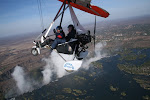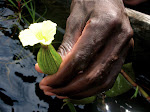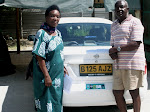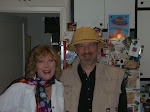

with photos of Sandy, chef Class and guide Borobi on the Karibu mobile safari during the time of not knowing who won the presidential election, plus a photo of me celebrating Obama at Dune 17 in the Namib Desert at Sossusvlei.
MAUN, BOTSWANA – We were in the bush searching for lions when the polls opened on the East Coast for the U.S. presidential election.
As we bounced along the sandy roads of the Moremi Game Reserve in the Okavango Delta, I turned to my friend visiting from Austin, Texas, and said, “They’ve started voting.”
What would the day bring?
In Botswana, nicknamed The Thirstland for its vast expanse of semi-arid desert, Nov. 4 brought this country’s greatest blessing from above: pula. The word means rain, money and “Cheers!” – especially cheers for the president. From my perspective, such a blessing was perfection on America’s election day.
We didn’t find the lions, because the season’s first crashing thunderstorm rolled over the delta, offering relief from temperatures of 47 degrees Celsius and water to parched animals. With no Internet, telephone, television or commercial radio, I and Dr. Sandy Garcia, an emergency room pediatrician and an Obama fan, were unplugged from the election’s moment-by-moment, red-blue-state updates.
Unplugged has been my mode of living for most of the months I have been in Africa, on sabbatical from my job as deputy editorial page editor at The Bee after falling head over heels for the African wilderness. Never before have I been so unaware of the world’s events, not from lack of interest but from lack of media in the bush. I found out two weeks after the fact that Russia had invaded Georgia. I peppered tourists as politely as possible for scraps of details about the U.S. presidential election, and each time I flew to Maun, I rushed to the Internet to try to catch up. It seemed an impossible task.
Time and again I have relied on local Botswana friends to relay the news, mostly by word of mouth. They’ve done so, even using the old-fashioned walkie-talkie-style radio at Desert and Delta Safari headquarters in Maun to provide me updates during the primaries. And, of course, I voted absentee in October from Cape Town – by fax.
The interest here in the election has astonished me. “A Black man in the White House?” was the front-page headline of Maun’s 12-page, weekly The Ngami Times (CQ) on Oct. 31. “That’s the question on everyone’s lips,” according to the story.
Wherever I’ve traveled on the continent, Africans -- white, black, brown, mixed -- have been pulling for Obama. (There was one exception: a white Zimbabwean who told me if “Hussein” were elected, it would be bad for the hunting business; wealth would be redistributed, discouraging rich Americans from booking hunting safaris.) In Zanzibar I met Masoud (CQ), who started a bona fide Tanzania for Obama movement by scrawling his support for Obama in ink on a Sebego shoe.
Masoud said Africans like the fact that Obama’s father was Kenyan. “But that’s not the main thing.” Hope is, he said. “My father insisted on honesty, sincerity and respect. I see that Obama embodies all those things my parents taught me.”
In September a flight attendant on Air Botswana pointed to the in-flight magazine and whispered proudly, “I’m a supporter of Obama. And that’s OUR Obama.” The magazine cover featured Botswana’s new president, Seretse Khama Ian Khama (CQ), the son of what is referred to in historical terms as “a marriage of inconvenience” between a white British woman and an Oxford-educated black tribal chief who became Botswana’s first president after independence in 1966. Many attribute Botswana’s racial harmony in part to the nation’s having had an interracial couple as founders, its version of George and Martha Washington.
Sandy and I rolled into Camp Moremi just before 11 a.m. on Nov. 5. Desert and Delta’s Munihango Limbo (CQ) walked toward me with a big smile. He had been watching election returns off and on all night in Maun before his flight to the lodge that morning.
“Obama won!” he said.
“Is it official?” I asked.
He said it was unofficial. Rats. After the 2000 and 2004 elections, I hesitated to jump to conclusions. I rushed to the radio to talk to Mos Bashe, in charge of lodge logistics for Desert and Delta in Maun and someone who had followed the campaign’s every twist and turn. It’s official, he told me. (Upon my return the next day to Maun, Mos, beaming and without a word, would throw his arms around me in a bear hug in celebration of the win.)
That Wednesday night at the lodge in the bush, Sandy and I were the only Americans, but the other guests – Europeans and Australians – were quick to sing out, “Brilliant show! Good job! Congratulations!” It was a fine celebration, even prompting me to make a speech and offer a toast.
In the days that followed while I traveled in Botswana and along the coastline and desert of Namibia, government officials at border posts, customs officials, receptionists, gas station attendants, waitresses, police officers, bar tenders – you name it – they all talked about the election. “Congratulations to you!” they cried, as if I had just birthed a baby. Thumbs-up was their universal greeting in honor of Obama.
“Obama is the 44th president of the Republic of the United States of America,” said Galerone Galeitsiwe (CQ), a truck driver in Maun. “Congratulations to you. It means the end of apartheid. Black, white, we’re all the same. Asia, Africa, America, we’re all the same.”
The view from Africa is an enlightened one. There is audacity in Galeitsiwe’s statement, echoing a sentiment of real optimism in the places I have traveled on this continent that America remains a beacon that stands for dreams, possibility, opportunity.
“If Obama can, we all can,” one East African told me.
To which I say, “Pula! Cheers to the president.”
























































